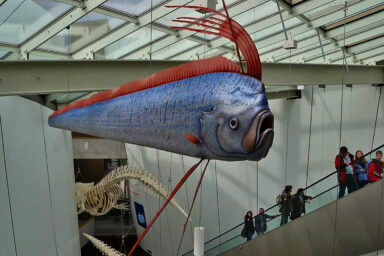Nations Must Embrace Change to Tackle Biodiversity Crisis, Researchers Say
|
Listen To This Story
|
PICKS are stories from many sources, selected by our editors or recommended by our readers because they are important, surprising, troubling, enlightening, inspiring, or amusing. They appear on our site and in our daily newsletter. Please send suggested articles, videos, podcasts, etc. to picks@whowhatwhy.org.
Nations Must Embrace Change to Tackle Biodiversity Crisis, Researchers Say (Maria)
The author writes, “Governments should embrace the realities of shifting biodiversity rather than ‘investing in futile efforts to return the natural world to its historic state,’ a new study argues. In a paper published in the run up to the United Nations conference, COP 15, the researchers suggest a new approach to conservation, which moves away from current efforts focused on resisting change, to efforts to ensure there are future benefits to nature and to people in the face of inevitable biodiversity shifts. The paper is published in the journal Ecological Solutions and Evidence.”
Jesus and the Founding Fathers: Christian Nationalism Is Playing a Major Role in Ozarks Politics (Dana)
From KSMU Radio: “The Ozarks has a rich religious history, and evangelical Christians make up one of the largest faith communities here. Their votes and their beliefs drive much of Ozarks politics. Scholars and preachers discuss the rise of Christian nationalism among some of the faithful — and what it might mean for southwest Missouri.”
SFPD Authorized to Kill Suspects Using Robots in Draft Policy (Sean)
From Mission Local: “A policy proposal heading for Board of Supervisors approval [this] week would explicitly authorize San Francisco police to kill suspects using robots. The new policy, which defines how the SFPD is allowed to use its military-style weapons, was put together by the police department. … The draft policy faces criticism from advocates for its language on robot force, as well as for excluding hundreds of assault rifles from its inventory of military-style weapons and for not including personnel costs in the price of its weapons.”
In California, 10 Percent of Legislature Now Identifies as LGBTQ (Reader Steve)
The author writes, “While LGBTQ candidates and their supporters celebrated several milestone victories around the nation in this year’s midterm elections, California quietly reached its own: At least 10% of its state lawmakers identify publicly as LGBTQ, believed to be a first for any U.S. legislature. The California legislators, all Democrats, are proud of their success but say it underscores the hard work that remains in their own state and elsewhere, such as handling the fallout from measures such as Florida’s ‘Don’t Say Gay’ law, which bans some lessons on sexual orientation and gender identity, or laws in other states limiting transgender students’ participation in sports or blocking gender-affirming medical care for youths.”
Inside the Wagner Group, Russia’s Mercenary Force (Mili)
From Al Jazeera: “The Wagner Group is shadowy and illegal, but it has been tracked to Ukraine, Syria, Libya, the Central African Republic, Mali, and elsewhere. It is known as a deadly fighting force of mercenaries with a goal of furthering Russia’s military interests around the world. One Wagner fighter is now speaking out about what life is like as a soldier for hire.”
The US Needs More Housing Than Almost Anyone Can Imagine (Sean)
The author writes, “No one can say just what it would take to make Brooklyn affordable for workers who don’t have a college degree, render San Francisco accessible to families with kids and elderly couples on fixed incomes, or allow extended-family members in Boston to buy apartments within a few blocks of one another. That means we have no policy vision of how to make our biggest, most productive places affordable for all, and no plan to get there.”
Australia: How ‘Bin Chickens’ Learned to Wash Poisonous Cane Toads (Mili)
From the BBC: “There are few Australian animals more reviled than the white ibis. It has earned the moniker ‘bin chicken’ for its propensity to scavenge food from anywhere it can — messily raiding garbage and often stealing food right out of people’s hands. But the native bird may have figured out how to overhaul its bad reputation. It has developed an ‘ingenious’ method of eating one of the only animals Australians hate more — the cane toad, a toxic and pervasive pest.”




